Introduction:
“Thug Kitchen Party Grub For Social Mother F*ckers was published on October, 13th 2015” (Amazon.com) by Thug Kitchen LLC based in Los Angeles, California and Rodale Inc. The book focuses on a wide range of vegan party foods and overall vegan dishes, from a simple salad bowl, to more complex and time consuming dishes such as an Apple-Coconut Bundt Cake (Thug Kitchen, pg. 186). It is written by co-authors Michelle Davis and Matt Holloway and is the second book from the duo.
When you first open the book, before even getting to the very first page, you will see almost like a comic book replica of a party scene, a sign that says: No Loitering in this Area, a shark head, a Do Not Enter sign, and balloons that say TK2 .
Another thing to take note of when looking through this book is the name Bryant Terry. Bryant Terry is a black social justice activist and writer. An article containing Terry’s thoughts on the book was published on CNN’s website back in 2014 titled “The problem with ‘thug’ cuisine” about his thoughts on the book and had a lot to say from this.
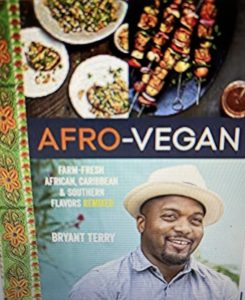
(Amazon,2014)
Terry’s thoughts on the term “Thug”
From the CNN article, as a social justice activist,writer, vegan, and black man living in America, Bryant Terry had a few thoughts when it came to the term thug and its association with African Americans and the black community as a whole. The article is titled, “The problem with ‘thug’ cuisine” in it, Terry discusses the name for the website of the book, Thug Kitchen and how it relates to both black culture and African Americans. He felt as if seeing food described in such an inappropriate way with cuss words was not a good representation of food in terms of cultural depictions of food and various representations.
“The pairing of vulgar, slang-heavy admonitions with big, bright, nutritious recipes was certainly visceral. But the more I read through the Thug Kitchen posts, the more skeptical I became about the cerebral and political aspects, if they even existed. I held out hope that Thug Kitchen was a ham-fisted attempt to craft viral memes that might positively influence the eating habits of the “thugs” that the wider culture imagines when that word is used: young black men living in low-income urban neighborhoods.” (Terry, 2014).
(Thug Kitchen: Party Grub, opening cover)
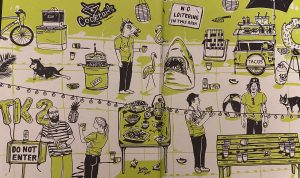
(Thug Kitchen: Party Grub, pg.24-25) (Recipe)
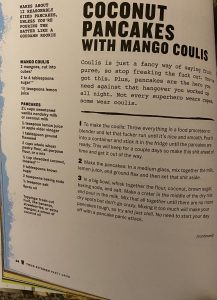
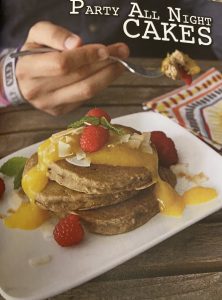
(Thug Kitchen: Party Grub, pg. 10)
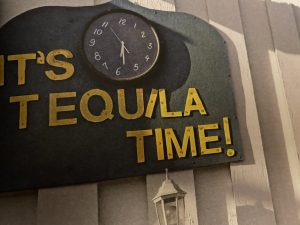
Setup of Cookbook
This cookbook’s setup is easy to follow step by step recipe format. There are illustrations throughout the book, most notably near the bottom of each page there are cups tilted on their side like a spilled drink and has the words house rules. Along with the easy to follow instructions, there are vibrant colors to keep the audience engaged with what they are reading, and the language is very conversational.
Audience/Cultural Representation
There are a couple audiences that are intended for this book most recognizable when reading are vegans. Other cultures represented are Asian Americans, French, and whites, but most notably African Americans. This is shown in Bryant Terry’s article with the use of the term “thug”. This negative term overall, misrepresents African American culture and African Americans as a whole. The representation of party goers, in this case has no specific gender although, relates to the African American community in a negative light. The cultural representation presents them as: animal-like, aggressive, loud individuals which is a false narrative created from history and other influences.
African American culture represented by the food from another source Veg News, it discusses how controversy and skepticism arose when Matthew Holloway and Michelle Davis’s co-authors of the book. “In 2012, Matt Holloway and Michelle Davis anonymously started the Thug Kitchen blog where they shared content written in African-American Vernacular English (AAVE) and often referenced rap lyrics, popular Black artists, and used curse words in conjunction with sharing vegan recipes and tips. Many followers believed that the blog’s creator was a POC and the use of the term “thug”—a racially charged descriptor often used to criminalize POC—was an honest attempt to redefine the race-coded word in order to promote veganism to communities of color.” (Starostinetskaya, 2020).
The general audience of wealthy and middle class Americans is also represented, some of the ingredients throughout the book are not found in an American household on a daily basis and hold more of a cultural representation.
Example: Baked Rice and Leek Cakes with a Sweet Sesame Teriyaki-Style Sauce
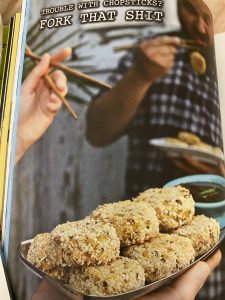
(Thug Kitchen Party Grub, pg.17)
Identity Work/Culinary Tourism
Identity represented in this book is shown through Identity work. The various pictures shown, relate to culture through food but, the description of the cooking process is another way identity work is shown. The description represents cultural tourism by having to use different ingredients typically seen in various cultures and creates that social, togetherness aspect of food.
References:
Davis, Michelle & Holloway, Matt. (2015). Thug Kitchen: Party Grub. United States: Rodale Inc.
Kitchen, T. (2015). Thug Kitchen party grub. Amazon. https://www.amazon.com/Thug-Kitchen-Party-Grub-Cookbooks/dp/1623366321.
Starostinetskaya, A. (2020, June 17). After Nearly a Decade of Profiting From Cultural Appropriation, Vegan Brand Thug Kitchen Will Finally Change Its Name. VegNews.com. https://vegnews.com/2020/6/after-nearly-a-decade-of-profiting-from-cultural-appropriation-vegan-brand-thug-kitchen-will-finally-change-its-name.
Terry, B. (2014, April 8). Afro-vegan: farm-fresh African, Caribbean, and Southern food remixed. Amazon. https://www.amazon.com/Afro-Vegan-Farm-Fresh-African-Caribbean-Southern/dp/1607745313.